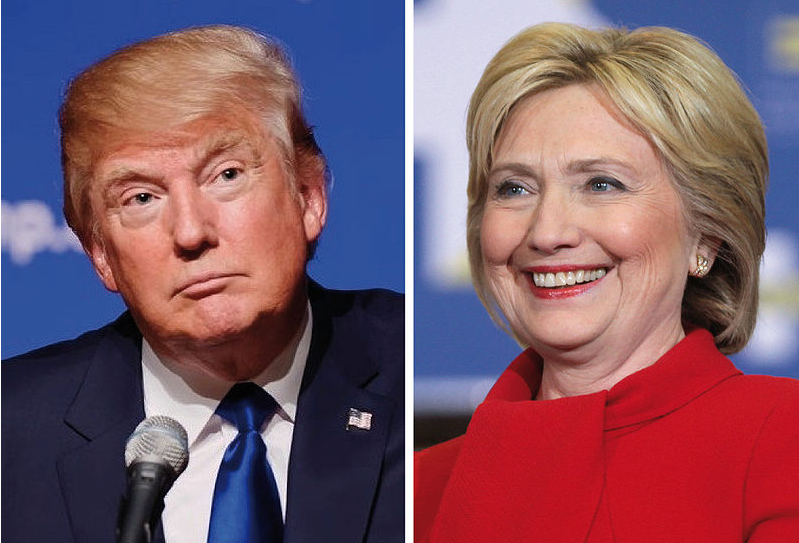Democratic presidential candidate Hillary Clinton is leading Republican Donald Trump in opinion polls, though her edge over the billionaire has narrowed. What might the outcome, as well as all of the heated political rhetoric, mean for the global economy and financial markets? Are concerns mounting among investors? Is it time for investors to re-adjust portfolio allocations?
According to David Lafferty, Chief Market Strategist at Natixis, when speaking to investors both in and outside of the U.S., the presidential election is almost always the number one question on their minds. He mentions their first caveat is to remind investors that proposal differences pre-election are always bigger than implementation differences post-election; divided government ensures that presidents get only a small portion of what they want. In general, this means that investors tend to put too much weight on election outcomes vis-à-vis portfolio expectations. “Guessing whether Mrs. Clinton will be bad for healthcare stocks or Mr. Trump will be good for defense/military stocks is a poor way to build a durable portfolio.”
Second, there is still a lot of time left. Due to the Electoral College math and superior fundraising and organization, Mrs. Clinton seems the odds-on favorite to win. But we still have a few weeks left. We’ve got one more debate to go, and with these two candidates, the final weeks offer a higher-than-usual chance for more bombshells (perhaps something in Donald’s tax returns or Hillary’s missing e-mails?).
“For sport, we’ll continue to handicap the outcome like everyone else, but if Brexit has taught us one thing, it’s that betting on the conventional wisdom can be dangerous. With too many variables still unknown, including the election winner, the make-up of Congress, or how proposals will morph into policy, long-term market implications are uncertain. To be sure, neither candidate has presented a convincing pro-growth policy that would boost economic activity or the equity markets. Regardless of the winner, Washington gridlock won’t likely produce major policy changes, although some modest corporate tax reform is possible. While long-run return implications are uncertain, we still believe that Mr. Trump’s newcomer status and lack of policy history would make him the source of more short-term volatility.” concluded Lafferty.
Natixis’ latest 2016 Global Financial Advisor Survey top findings include:
U.S. advisors say neither candidate will be better
U.S. advisors appear to be ambivalent or unconvinced when it comes to who they think could have the most positive impact on five key factors: the stock market, bond market, global economy, global trade, and geopolitical risk.
Given the choice between Clinton, Trump, either, or neither, 40% of respondents in the U.S. chose “neither” for all factors with the exception of global trade, where 32% believe Clinton will fare better, and geopolitical risk where Clinton received the highest number of responses at 35%.
Globally, advisors say Clinton will be better
Outside the U.S., it appears that financial professionals believe Hillary Clinton would have a more positive impact on all five factors. Clinton’s numbers in each run in the mid-40s and mid-50s, while those believing Trump would result in better outcomes numbered in the mid-teens. Country to country there are some variances in responses. But overall, advisor sentiment was relatively consistent from country to country.
What advisors think about next U.S. President
-Stock markets
U.S. respondents over the age of 47 believe Trump will be better for the market
(34%) compared to Clinton (21%) while 37% answered neither.
57% of women advisors globally believe Clinton will be better for the stock market.
– Bond markets
47% of advisors globally give Clinton the edge for bonds compared to 14% who believe Trump will be best.
Colombia (65%), Chile (61%), Spain (57%), Italy (55%) and Panama (55%) report the strongest inclination that Clinton will be best for bonds. France is a significant outlier from this trend with 47% of advisors choosing “neither.”
– Global economy
43% of U.S. women advisors believe Clinton will be better for the global economy
compared to 19% who believe Trump will be better.
Globally, 44% of advisors favor Clinton on the global economy, 27% say neither, 16% favor Trump and 13% call it a toss-up.
– Geopolitical risk
42% of U.S. Independent Advisors and 45% of U.S. women advisors believe Clinton will be better on geopolitical risk. For women globally, the number reached 62%.
1% of advisors with books of business above average ($29.5 million is sampling’s average size) favor Clinton on geopolitical risk, 29% say neither and 23% say Trump. Those with books below average are more likely to say neither (39%).
Chris Wallis, CIO Vaughan Nelson Investment Management, recommends investors to ignore the election, reminding them that looking back at U.S. presidential history for over 180 years, one can see that the elected president has never really had a big impact on the financial markets. “There is no doubt about it – the U.S. has an interesting pair of presidential candidates this election season. They are offering very different policy choices across the board – from foreign, trade, tax, economic, healthcare to immigration policy. But that being said, I really don’t believe it makes any difference to the markets and long-term investors’ portfolios whether Hillary Clinton or Donald Trump wins on November 8.”
